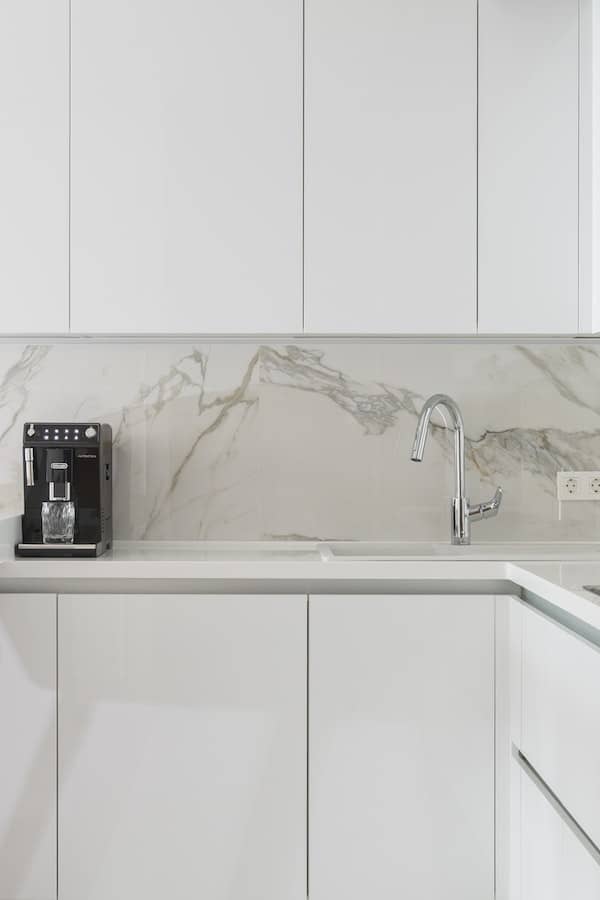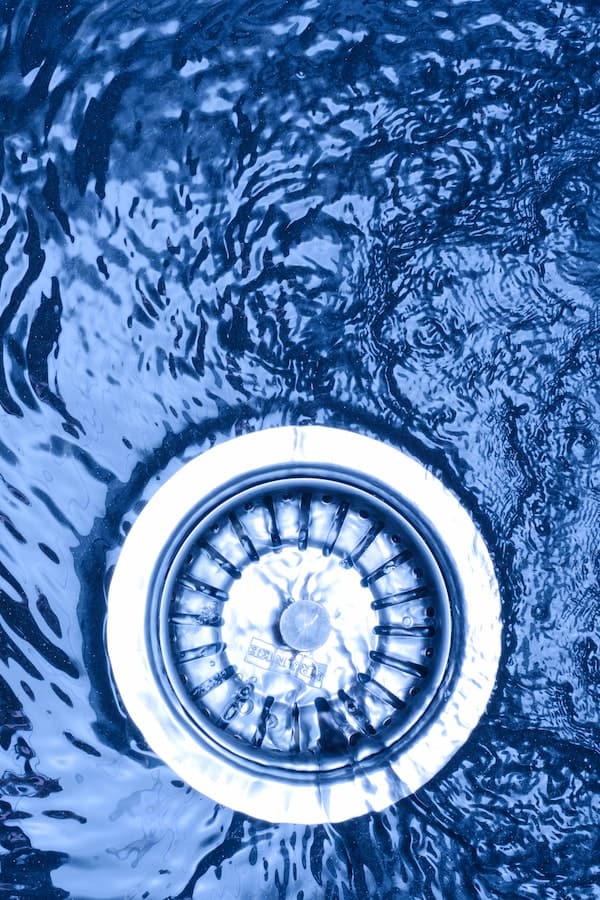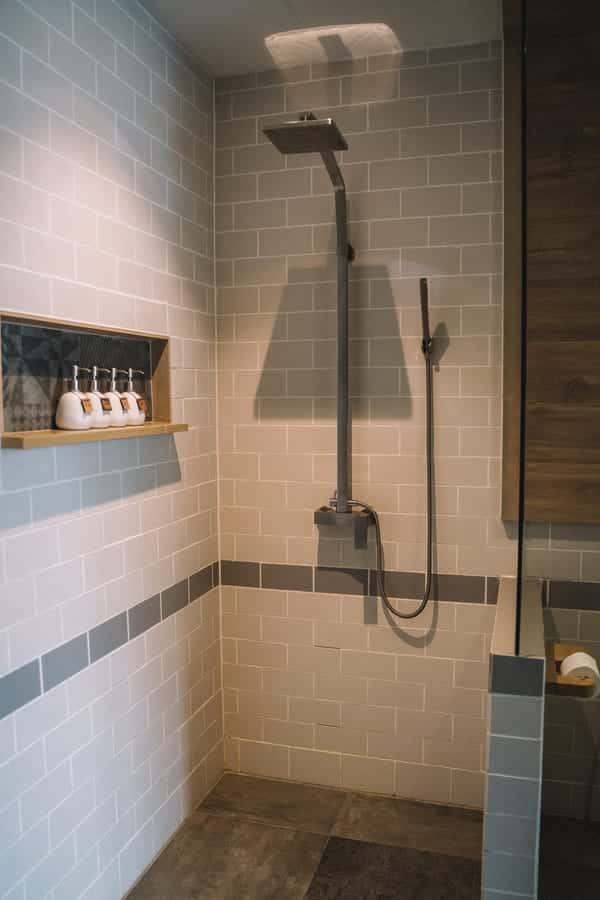Marble is a beautiful stone that can add elegance to any room. It’s also very durable and will last for many years under the right conditions.
It has been used over the years all over households, from kitchen tops to bathrooms. But there are a few things you should know about cleaning marble so that you don’t damage it or create more work for yourself in the future.
These tips are all the more important in your bathroom, as showers can be a dangerous spot for marble due to the water and cleaning products usually used there.
In this guide, we’ll go over everything you need to know about cleaning your marble shower so that it stays clean and beautiful for years to come! Keep reading to become a true marble cleaning expert…
There may be affiliate links in this article. You can read more about this in my disclosure.
What are the different types of marble?

Marble is a metamorphic rock that occurs in many colors and patterns. Some varieties include:
White Marble
White marble can be either pure white or have a slight gray or taupe hue to it. It has been used for centuries as a decorative material.
This marble is particularly susceptible to stains.
Black Marble
Black marble comes in both veined and veins-free varieties.
Its dark color gives it an elegant look that’s often used in home decorating projects that require formal elements like crown molding and fireplace surrounds. This type of marble can easily lose its shine.
Green Marble
Green marble is generally found only in some parts of the world, such as Turkey and Greece; however, there are some companies offering “green” products based on artificial dyeing processes where they don’t use natural green stone but instead produce their own unique coloration through chemical processes (such as mixing dyes).
These faux marbles may be less expensive than real ones but won’t last as long—and they’re usually not environmentally friendly either.
Whatever type of marble you have in your house, make sure you clean it properly. An incorrect technique or harsh products can end up ruining it.
What type of stains are most common in a marble shower?

Stains from water
Yes, water CAN damage your marble. Which is a big problem if you have a marble shower.
As surprising as it sounds, stone is a porous material of varying degrees depending on the type of marble. The more porous the marble, the more likely it is to get damaged by overexposure to water.
Water can cause damage if you don’t clean it off quickly enough, as the stone has tiny capillaries where the humidity sneaks in.
If you leave water stains on your marble for too long, they will turn into permanent spots and discolor your stone as they grow larger, think of a large puddle for example.
If you leave little droplets on your marble for a long time this can diminish the shine of your marble, streaks and water marks will appear, eventually tarnishing and damaging it.
Stains from soap or body oil
Soap residue is another common problem when cleaning a marble shower—it leaves behind a sticky film that can be difficult to remove with just water alone.
Body oil tends to build up over time as well, causing streaks across the surface of the marble and making it look dirty much sooner than it is.
Water marks, soap residue and body oils can usually be removed using non-abrasive cleaner.
Rust marks
If you do not look after your shower parts correctly, they can rust and leave nasty marks down your marble. Although this shouldn’t happen if the shower is correctly installed, it isn’t unheard of.
Keep an eye out for any marks, the earlier you catch them the easier it will be to get rid of them.
What do I need to clean my marble shower?
To get your marble shower looking like new, you’ll need:
- A bucket
- Rubber gloves (optional)
- A sponge
- A cleaning cloth
- Marble cleaner or a homemade water and dish soap solution
- A squeegee
What products are safe to use on marble?
Using the wrong cleaning products on marble can cause it to stain and discolor. The absolute worst thing you can do is use abrasive cleaners, acidic cleaners, bleaches, vinegar, harsh chemicals, or ammonia-based products.
You should also avoid using any product that contains lime or rust removers as these are likely to cause damage if used regularly.
Products containing waxes or oils should also be avoided as they can attract dirt and leave a residue behind once dry.
Cleaning products are not the only items to look out for, check your shampoo, soap, and hygiene products, make sure they do not contain any harsh ingredients.
This may sound like we’re being over cautious, but the acid in these products breaks down the surface layer of the marble. This chemical reaction will make your marble lose its shine and eventually permanently stain.
What are the most effective methods for cleaning a marble shower?

The bottom line is: you need to maintain your shower, as once it is dirty, it’s quite tricky to clean. That being said, if you do have a dirt build up, it’s not the end of the world.
It may seem tricky to find a suitable cleaning product once you remove all abrasive ingredients, bleaches, vinegars, ammonium-based solutions etc. Nowadays there is a large range of available products in supermarkets and specialized marble shops.
Sometimes it seems almost overcomplicated, so if you’re overwhelmed by the choice, remember normal dish soap also does the trick. In terms of method, remember that you need to be gentle.
Don’t put too much elbow grease into scrubbing, as this will damage the surface. You should prioritize frequency and maintenance over scrubbing vigorously.
And of course, remember to buffer the marble after every wash. It seems like a lot of effort to go to, but it really does make a huge difference.
[amazon box=”B076H8SGQ4″ template=”vertical”]How to maintain my marble shower on a daily basis
It’s not necessary to deep clean your shower every day, however, is it important to check there isn’t any water residue, lingering humidity or puddles left there.
After every use, dry your shower using a squeegee and or a microfiber cloth. This will prevent wet areas from damaging and staining the shower.
This is probably the most important part of looking after your marble, if you prevent the staining from happening you are saving yourself a future headache.
Regular care for your marble will mean that it will last for years as it is a very durable material.
[amazon box=”B07F9RGM6B,B07HRCDDL1″ grid=”2″]How to clean my marble shower weekly
You should deep clean your shower every week, doing so will make sure you remove any dirt that can do permanent damage to the marble.
To do so make sure you have a soft cloth or sponge, mild soap or detergent, or a non-abrasive cleaning agent on hand before you start.
Mix 3 tablespoons of soap with 3 liters of warm water and mix well to dissolve. Use your sponge and rub in gentle, circular motions.
Be careful not to let the water sit on the surface for too long—it can cause discoloration over time. If you have a few tough stains, apply a small amount of mild soap or detergent to the cloth/sponge, then use it directly on the stain without diluting it.
Rinse with water; repeat, if necessary, until all grime is gone from inside your shower stall.
Once you rinse with cold water, take a clean, dry microfiber cloth and buffer your marble. This will give it extra shine and make it look brand new!
[amazon box=”B08D6G6SQQ,B007S0QYAU” grid=”2″]To sum up, what are the dos and don’ts of marble care?
- You should use a marble cleaner that is specifically made for shower surfaces
- You should not use any hard scrub brushes on your shower.
- You should not use vinegar or bleach as these can cause etching in the stone.
- You should not use any cleaning products containing ammonia because they will soften the surface of your marble and make it susceptible to staining.
- You should not let water stagnate on your floor
- You should dry your walls and floor of the shower after every use
Conclusion
With these tips and tricks, you’ll be able to keep your marble shower looking beautiful for years to come.
Remember that marble is a natural stone that can be damaged by too much soap or scrubbing, so always test out new cleaning products on a small area before applying them to large areas of your shower.
Keep your shower dry, buffed and looked after and you will enjoy your marble for decades.



